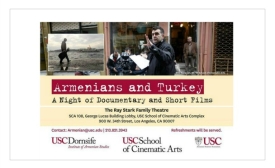turkey
The second area of Turkey’s ethos gap is in relation to the Kurdish question and the confrontations with Armenians and Alevis – longstanding conflicts inherited from the Ottoman Empire. These disputes influence Turkey’s global reputation and challenge the vision of its highly idealistic values-driven foreign policy discourse.
![Photo reprinted courtesy Hilmi Hacaloğlu (VOA) [Public domain], via Wikimedia Commons Protests in Turkey after the murder of Özgecan Aslan, February 2015](https://uscpublicdiplomacy.org/sites/default/files/styles/275x168/public/uploads/%C3%96zgecan_Aslan_protests.jpg?itok=1925B9dr)
The conclusion of Senem Cevik's thoughts on Turkish nation branding.
More than 100 people gathered in front of the Islamic Arts museum in Istanbul on Friday to commemorate the massacre of Armenians during the last days of the Ottoman empire. [...]The commemoration, organized by Turkish and international human rights organizations, was one of a series of events taking place in Istanbul to mark the centenary of the Armenian genocide during which more than 1.5 million Armenians were killed, according to historians’ estimates.
After a quarter of a century since the end of the Cold War, many challenges and threats, as well as opportunities today define a transformation process still ongoing at the global level. With its political stability, vibrant economy, young and dynamic population and active diplomacy, Turkey is an emerging powerhouse. (...) On this basis, the four fundamental elements of Turkey’s multi-dimensional foreign policy are; relations with neighbors and nearby basins, opening up to new geographies, effective role in international organizations and platforms and depth in strategic relations.
Turkey's ruling Justice and Development Party discovered the effectiveness of “soft power” early on in its rule. Soft power was successfully used to promote Turkey as a modern Muslim democracy. Unfortunately, this has now gone into reverse gear due to the increasing authoritarian trends of Turkey's leadership.

Turkey and Pakistan have turned to political dialogue in an attempt to resolve tensions surrounding the conflict in Yemen between Houthi militias and Saudi-led coalition of Arab countries. Turkey has been in close contact with regional and international powers to seek a solution in Yemen which includes all the country's parties, while not overshadowing its territorial integrity.
Turkey and Pakistan, two of the biggest military powers in the Muslim world, have launched a diplomatic initiative in an effort to prevent the conflict in Yemen from exploding into a regional one. (...) The intense series of consultation comes two weeks after a Saudi Arabia-led coalition launched a bombing campaign over Yemen aimed at halting Houthi advances.







